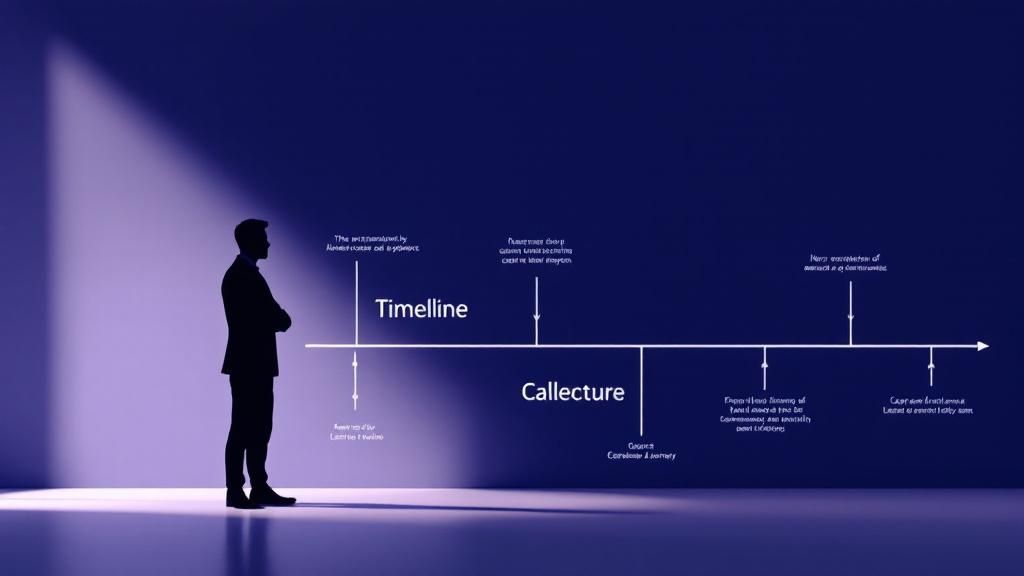August 11, 2025
8 Essential Preliminary Interview Questions for 2025

In today's competitive talent market, the initial 15-30 minute conversation is more critical than ever. It's not just about verifying a resume; it's about identifying potential, assessing alignment, and ensuring you invest time in the right candidates. Moving beyond generic queries to a strategic set of preliminary interview questions can dramatically improve hiring accuracy and efficiency. This guide breaks down eight foundational questions, providing a deep dive into the 'why' behind each one.
We'll explore the subtle cues to listen for, offer fresh perspectives on assessing responses, and equip you with the insights needed to transform your screening calls from a simple checklist into a powerful diagnostic tool. By mastering these questions, you can cut through the noise and pinpoint high-potential candidates who possess the skills, motivation, and cultural fit to thrive in your organization.
Furthermore, for teams looking to supercharge their initial screening, leveraging AI-powered tools to analyze resumes at scale can free up valuable time. This allows you to focus these critical human-to-human conversations on the most qualified applicants from the very start. For streamlined scheduling, consider using platforms that allow candidates to easily schedule preliminary interviews directly, creating a smoother experience for everyone involved. This comprehensive approach ensures you are not only asking the right questions but also managing the process efficiently, setting the stage for a successful hire.
1. Tell Me About Yourself
This seemingly simple request is one of the most powerful preliminary interview questions an interviewer can ask. Far from being just small talk, "Tell Me About Yourself" is a strategic opener that serves as a diagnostic tool. It invites the candidate to present their own professional narrative, providing immediate insight into their communication skills, self-awareness, and understanding of the role's requirements.

A well-prepared candidate will not recount their entire life story. Instead, they will deliver a concise, compelling pitch that connects their past experiences to the present opportunity and their future aspirations. This question sets the stage for the rest of the interview, allowing you to gauge confidence and preparation from the very beginning.
How to Assess the Response
Evaluating a candidate’s answer goes beyond just the words they use. A strong response demonstrates that the candidate has done their homework and can articulate their value proposition effectively.
- Structure and Clarity: Look for a logical flow, often following a Past-Present-Future model. They should start with a brief overview of relevant past experience, connect it to their current situation and skills, and finish by explaining why they are interested in this specific role and your company for their future growth.
- Relevance: The best answers are tailored. Does the candidate highlight skills and achievements listed in the job description? A generic, one-size-fits-all answer can be a red flag, suggesting a lack of genuine interest.
- Conciseness: An ideal response is typically 90 seconds to two minutes long. A rambling, unfocused answer may indicate poor communication skills or a lack of preparation.
- Enthusiasm and Confidence: Note their tone and body language. Do they seem genuinely excited about the opportunity, or are they reciting a memorized script?
Key Insight: This question isn't just about the candidate's history; it's a test of their ability to synthesize information, communicate effectively, and demonstrate relevance under pressure. For more guidance on refining your initial screening process, you can explore additional interview screening questions on klearskill.com.
2. Why Are You Interested in This Position?
This is one of the most revealing preliminary interview questions you can ask, as it directly probes a candidate's motivation and the depth of their interest. It quickly separates applicants who are mass-applying to any open role from those who have specifically targeted your company and this position. The answer reveals how much research the candidate has done, how well they understand the role, and whether their career goals align with the opportunity you are offering.

A strong candidate will provide a thoughtful, well-researched response that seamlessly connects their skills and passions to the company's mission and the specific duties of the job. This question gives you a clear window into their potential for engagement and long-term commitment. For example, a tech firm like Microsoft might use it to assess alignment with its innovation culture, while a non-profit will listen for genuine passion for its cause.
How to Assess the Response
A compelling answer to this question is layered, demonstrating enthusiasm for the company, the role, and personal career growth. Vague flattery or a focus solely on salary are immediate red flags.
- Company-Specific Research: Does the candidate mention specific projects, company values, recent news, or a particular product they admire? This proves they’ve moved beyond a superficial glance at your homepage and have invested time in understanding your organization.
- Role Alignment: A great response connects the dots. The candidate should articulate how specific responsibilities listed in the job description align with their skills and what they enjoy doing professionally. They should show excitement for the actual work.
- Genuine Motivation: Look for authentic enthusiasm. Do they talk about an opportunity to learn a new skill, contribute to a mission they believe in, or solve a problem they find interesting? Avoid candidates whose answers sound generic enough to be used for any company.
- Long-Term Vision: The best answers often touch on how this position fits into their broader career aspirations. This shows they are thinking strategically about their future and see your company as a place where they can grow.
Key Insight: This question is a powerful filter for genuine interest versus casual job hunting. A candidate who can clearly articulate why they want this specific job is more likely to be an engaged, motivated, and committed employee.
3. What Are Your Strengths?
This classic preliminary interview question is far more than an invitation for a candidate to boast. It is a critical self-assessment tool that reveals a candidate's self-awareness, their understanding of the role's core requirements, and their ability to articulate their value. How a candidate frames their strengths provides a window into what they value professionally and how they see themselves contributing to your team.

A strategic candidate will move beyond generic claims and connect their top abilities directly to the job description. For instance, a sales candidate might highlight their skill in building rapport, while an engineer might focus on their methodical problem-solving approach. This question allows you to quickly gauge whether a candidate has accurately identified the key competencies needed for success in the position.
How to Assess the Response
Evaluating the answer requires listening for evidence-backed claims rather than just accepting abstract labels. A strong response is both confident and substantiated, showing the candidate can connect their skills to real-world outcomes.
- Relevance and Specificity: Does the candidate highlight strengths that are crucial for the role? Top-tier candidates will select two or three key strengths and provide specific examples. They avoid clichés like "workaholic" and instead offer tangible skills like "data-driven decision-making" or "cross-functional project leadership."
- Evidence-Based Examples: A great answer is supported by a brief story or metric. Look for candidates who naturally use a simplified STAR method (Situation, Task, Action, Result) to illustrate their strength. For example, "My strength is in process optimization. In my last role [Situation], I noticed our reporting process was taking 10 hours a week [Task]. I developed an automated script [Action] that reduced the time to just 15 minutes, saving the team over 38 hours a month [Result]."
- Authenticity and Alignment: Does the strength sound genuine to the candidate and their experience? The answer should align with the information on their resume and their responses to other questions. This consistency indicates a high level of self-awareness.
- Clarity and Confidence: The candidate should be able to articulate their strengths clearly and without hesitation. This demonstrates confidence in their abilities and good preparation for the interview.
Key Insight: This question is a test of a candidate's ability to match their professional identity to the needs of your organization. It separates those who have done their research from those who have not. To gain deeper insights into candidate traits, learn more about leveraging personality assessments for hiring.
4. What Are Your Weaknesses?
This classic, and often dreaded, preliminary interview question is a powerful test of a candidate's self-awareness, honesty, and commitment to personal growth. Its purpose isn't to uncover a fatal flaw that disqualifies them, but rather to see how they handle constructive self-criticism. It reveals a candidate’s level of maturity and their proactive approach to professional development.

Popularized by traditional behavioral interviewing methods, this question moves beyond a candidate's curated list of strengths to explore their character. A thoughtful response demonstrates humility and a growth mindset, two highly valuable traits in any employee. It shows you whether a candidate can be vulnerable and if they are genuinely invested in continuous improvement.
How to Assess the Response
Evaluating the answer to "What are your weaknesses?" requires listening for a balance of authenticity and professionalism. A great response is structured and shows a clear path from awareness to action.
- Authenticity and Relevance: The weakness should be genuine but not a critical flaw for the role. For example, a candidate for a financial analyst role might mention a past struggle with public speaking, which is less critical than a weakness in attention to detail. Clichéd "strengths-in-disguise" answers like "I'm a perfectionist" or "I work too hard" often signal a lack of genuine self-reflection or an attempt to dodge the question.
- Demonstrated Self-Awareness: The candidate should clearly articulate the weakness and understand its potential impact. This shows they have taken the time to reflect on their professional performance.
- Focus on Action and Improvement: The most crucial part of the answer is the follow-through. A strong candidate will immediately pivot to describing the concrete steps they have taken, or are currently taking, to mitigate this weakness. This could include mentioning specific courses, mentorship, or new habits they've adopted. For example, a creative professional might mention taking a project management course to improve their organizational skills for handling complex client feedback.
- Ownership: Listen for "I" statements. The candidate should take full ownership of their development area rather than blaming past employers, colleagues, or circumstances.
Key Insight: This question isn't a trap; it's an opportunity. The best candidates use it to showcase their resilience and dedication to professional development, turning a potential negative into a compelling story of growth and accountability.
5. Where Do You See Yourself in 5 Years?
This classic, forward-looking question is a powerful tool in any set of preliminary interview questions. It moves beyond a candidate's past performance to explore their ambition, self-awareness, and long-term career planning. More importantly for the interviewer, it provides a critical glimpse into whether the candidate's personal goals align with the company's trajectory and the potential growth paths within the role.
This question helps you gauge a candidate's realism and foresight. It also functions as a subtle retention predictor; a candidate who sees the position as a mere stepping stone to an unrelated field may not be a long-term fit, whereas one who envisions growing with the company is a much stronger investment.
A thoughtful response will demonstrate that the candidate has considered their future and understands how this specific opportunity fits into their strategic career path. It’s a chance to see if they are looking for a job or building a career.
How to Assess the Response
Evaluating the answer to this question requires you to look for alignment, ambition, and realism. A strong candidate provides a response that is both inspiring and grounded in the context of your organization.
- Alignment with Company Growth: The best answers connect personal aspirations directly to the opportunities available at your company. For example, a candidate might say they want to become a subject matter expert in an area core to your business or take on mentorship responsibilities as the team expands. This shows they've researched your company and see a future there.
- Focus on Development, Not Just Titles: Be wary of candidates who fixate on specific, lofty titles like "Vice President." A more compelling response focuses on the skills they want to acquire, the impact they want to make, and the responsibilities they hope to earn. This indicates a growth mindset rather than a preoccupation with status.
- Realistic Ambition: The answer should be ambitious but plausible. A candidate for an entry-level role who expects to be CEO in five years may be out of touch. Look for goals that show a desire to progress but also an understanding of typical industry career trajectories.
- Demonstrated Commitment: Does their five-year plan sound like it involves your company? A vague answer or one that suggests a desire to start their own unrelated business could be a red flag for retention. In contrast, enthusiasm for growing within the organization is a strong positive signal.
Key Insight: This question is less about predicting the future and more about understanding a candidate's motivations and a "culture add" potential. A candidate who has a well-reasoned plan that aligns with your company's future is likely to be more engaged, motivated, and a better long-term asset.
6. Why Are You Leaving Your Current Job?
This question is a classic in any list of preliminary interview questions, and for good reason. It’s a direct probe into a candidate's motivations, professionalism, and potential red flags. The answer provides a window into their attitude towards past employers, their career drivers, and whether they are running away from a problem or running towards an opportunity. This question helps you understand if their reasons for leaving align with what your company and the role can offer.
A candidate's response reveals much about their character. Are they seeking growth, a better work-life balance, or a new challenge? Or are they complaining about their previous manager, company culture, or workload? Their framing of the situation is critical, offering powerful clues about their resilience, positivity, and professional maturity.
How to Assess the Response
Evaluating the answer requires listening for both what is said and what is left unsaid. A strong candidate will handle this delicate question with honesty and tact, turning a potentially negative topic into a positive one.
- Positive vs. Negative Framing: The best candidates focus on the "pull" factors of your opportunity rather than the "push" factors of their old job. They will talk about seeking new challenges, aligning with your company's mission, or pursuing specific growth opportunities that their current role lacks. A response full of complaints is a major red flag.
- Professionalism and Discretion: Listen for how they speak about their former employer, colleagues, and managers. A candidate who badmouths a previous company is likely to do the same to yours. Look for diplomacy and respect, even when discussing difficult situations.
- Alignment with the Role: Does their reason for leaving make sense in the context of the job they are applying for? For example, if they say they are seeking more leadership responsibility, the role should logically provide that. A mismatch suggests they haven't fully considered the opportunity or are not being entirely truthful.
- Honesty and Consistency: While you expect a strategic answer, it should still feel genuine. If a candidate was part of a layoff, they should state it simply and professionally before pivoting to what they are looking for next. Vague or evasive answers may indicate they are hiding something.
Key Insight: This question is less about the literal reason for their departure and more about their professionalism, self-awareness, and future ambitions. A great answer is forward-looking and demonstrates a clear, positive motivation for making a change.
7. Describe a Challenge You've Overcome
This classic behavioral question is a cornerstone of preliminary interview questions because it moves beyond theoretical capabilities to explore real-world performance. Asking a candidate to describe a challenge they've overcome is a direct inquiry into their problem-solving skills, resilience, and capacity for growth. It reveals how they navigate pressure and learn from adversity, offering a window into their resourcefulness and mindset.
This question is particularly useful because its application is so broad. For project management roles, it can reveal crisis management skills. In customer service positions, it helps evaluate conflict resolution abilities. For leadership roles, it provides a powerful gauge of a candidate's decision-making process under pressure and their accountability.
A strong candidate will use this opportunity to showcase not just what went wrong, but how their specific actions led to a positive resolution. The story they tell reveals their character, work ethic, and ability to contribute positively to a team, especially when things don't go according to plan.
How to Assess the Response
Evaluating the answer requires listening for more than just a good story. You are looking for evidence of specific competencies that align with the demands of the job.
- Structure and Ownership: The best answers often follow the STAR method (Situation, Task, Action, Result). This framework provides a clear, logical narrative. Crucially, listen for the candidate’s emphasis on the "Action" part. They should focus on what they did, taking ownership of their role rather than blaming others or external factors.
- Professional Relevance: The chosen challenge should be professional, not personal. A story about a difficult project, a tight deadline, or a conflict with a stakeholder is far more telling than a personal struggle. The relevance of the challenge to the potential role is also a key indicator of their understanding of what the job entails.
- Problem-Solving Process: Does the candidate describe a thoughtful, analytical approach? Look for evidence of how they assessed the situation, considered different options, and made a deliberate choice. A reactive, chaotic response is a red flag.
- Learning and Growth: A truly exceptional answer concludes by highlighting the lessons learned. The candidate should be able to articulate how the experience changed their approach and how they have applied that learning in subsequent situations. This demonstrates a growth mindset and a commitment to continuous improvement.
Key Insight: This question isn't about finding a candidate who has never failed; it's about finding one who learns and grows from challenges. Their ability to analyze a past difficulty and extract valuable lessons is a strong predictor of future success and resilience.
8. Do You Have Any Questions for Us?
Often reserved for the end of the interview, this question is far more than a polite closing gesture. It's a critical litmus test for a candidate's engagement, preparation, and genuine curiosity. How a candidate responds reveals the depth of their interest, their thought process, and what they truly value in a potential employer, making it one of the most insightful preliminary interview questions.
This moment shifts the power dynamic, allowing the candidate to interview you. A passive candidate might have no questions, while a truly invested one will use this opportunity to clarify expectations, understand the culture, and assess if the role is the right fit for them. Their questions provide a direct window into their priorities and level of critical thinking.
How to Assess the Response
Evaluating the quality of a candidate's questions is key to understanding their motivations and how seriously they are considering the opportunity. A strong candidate will have prepared thoughtful, specific inquiries that go beyond surface-level information.
- Preparation and Research: The best questions demonstrate that the candidate has done their homework. Did they research your company's recent projects, read about your team, or think critically about the role's challenges? Questions about company growth, team dynamics, or specific success metrics show initiative.
- Level of Insight: Generic questions about salary or benefits (which are better saved for later stages) can signal a lack of deeper interest. In contrast, questions tailored to the organization's context are highly valuable. For instance, a candidate for a startup might ask about funding and growth trajectory, while someone applying to an established corporation might inquire about long-term career progression paths.
- Mutual Fit Evaluation: Thoughtful questions indicate the candidate is evaluating you as much as you are evaluating them. Inquiries about team collaboration styles, management philosophy, or what a successful first 90 days looks like reveal a desire to ensure a strong mutual fit.
- Active Listening: Pay attention to whether they ask follow-up questions based on the conversation you've just had. This demonstrates excellent active listening skills and the ability to think on their feet, rather than just reading from a pre-written list.
Key Insight: This question transforms the interview from a one-way assessment into a two-way dialogue. The quality and nature of a candidate's questions are a powerful indicator of their engagement and foresight. By encouraging this dialogue, you also significantly enhance the candidate's journey. To further refine this crucial part of your process, learn more about how to improve the candidate experience on klearskill.com.
Preliminary Interview Questions Comparison
From Questions to Quality Hires: Your Next Steps
Navigating the landscape of preliminary interview questions is far more than a simple box-ticking exercise. It's a strategic art form that, when mastered, transforms your entire recruitment funnel. The eight foundational questions we’ve explored, from "Tell Me About Yourself" to "Do You Have Any Questions for Us?", are not just conversational icebreakers. They are precision tools designed to reveal a candidate's core motivations, self-awareness, problem-solving capabilities, and genuine interest in your organization.
By moving beyond rehearsed, surface-level answers, you begin to uncover the crucial nuances that separate a good candidate on paper from a great long-term hire. A well-executed preliminary interview acts as a powerful filter, ensuring that the time and resources invested in later, more intensive interview stages are spent only on the most promising, well-aligned individuals. This initial conversation sets the tone for the entire candidate journey, establishing a professional, respectful, and insightful process from the very first interaction.
Synthesizing the Insights: Beyond the Questions Themselves
The true value of mastering these preliminary interview questions lies not in asking them, but in interpreting the responses. It's about listening for what is said and, just as importantly, what is left unsaid. Think of each question as a lens through which you can view a different facet of the candidate:
- Motivation and Alignment: Questions like "Why are you interested in this position?" and "Why are you leaving your current job?" cut straight to a candidate's core drivers. Are they running away from something negative or running toward an opportunity that genuinely excites them? Their answers reveal the depth of their research and the sincerity of their interest.
- Self-Awareness and Growth Mindset: The classic duo of "What are your strengths?" and "What are your weaknesses?" directly tests for introspection and a commitment to continuous improvement. A candidate who can articulate a genuine weakness and detail their efforts to mitigate it demonstrates a level of maturity that is invaluable in any role.
- Ambition and Strategic Fit: "Where do you see yourself in 5 years?" helps you understand if a candidate's personal career trajectory aligns with the opportunities your company can realistically offer. This alignment is critical for ensuring long-term employee satisfaction and retention.
- Problem-Solving and Resilience: By asking a candidate to "Describe a challenge you've overcome," you gain a direct window into their professional resilience and practical skills. This behavioral question provides tangible evidence of their ability to handle pressure and navigate workplace complexities.
Ultimately, your goal is to weave these individual threads of information into a comprehensive tapestry of the candidate’s professional identity. The preliminary interview is your first and best chance to do so efficiently.
Putting It All into Action: Your Strategic Next Steps
Armed with this deeper understanding, your immediate priority should be to standardize and refine your approach to these initial screenings. Don't leave this critical first step to chance or improvisation.
- Create a Standardized Guide: Develop a brief, internal guide for your hiring managers and recruiters that outlines these core preliminary interview questions, the rationale behind each one, and key things to listen for in a response. This ensures consistency across all initial screenings.
- Train Your Team: Host a short workshop to role-play and discuss how to probe deeper. Practice asking follow-up questions to gently challenge vague answers and encourage more specific, evidence-based responses.
- Integrate with Technology: The most significant bottleneck in any hiring process is the top of the funnel-the sheer volume of initial applications. Manually sifting through hundreds of resumes to find candidates worthy of a preliminary interview is a monumental time sink.
This is where intelligent automation becomes a game-changer. By leveraging technology to handle the initial screening, you ensure that the valuable, human-to-human interaction of the preliminary interview is reserved for candidates who are already pre-vetted for core competencies and alignment. This strategic combination of high-tech efficiency and high-touch, insightful questioning is the hallmark of a modern, world-class recruitment function. It allows you to build a hiring engine that is not only fast but consistently delivers the high-quality talent your organization needs to thrive.
Ready to stop wasting time on unqualified candidates and focus your energy on strategic conversations? Klearskill uses advanced AI to instantly analyze resumes and score candidates for compatibility, ensuring your preliminary interviews are always with the most promising talent. Discover how to build a faster, smarter, and more effective hiring funnel at Klearskill.
